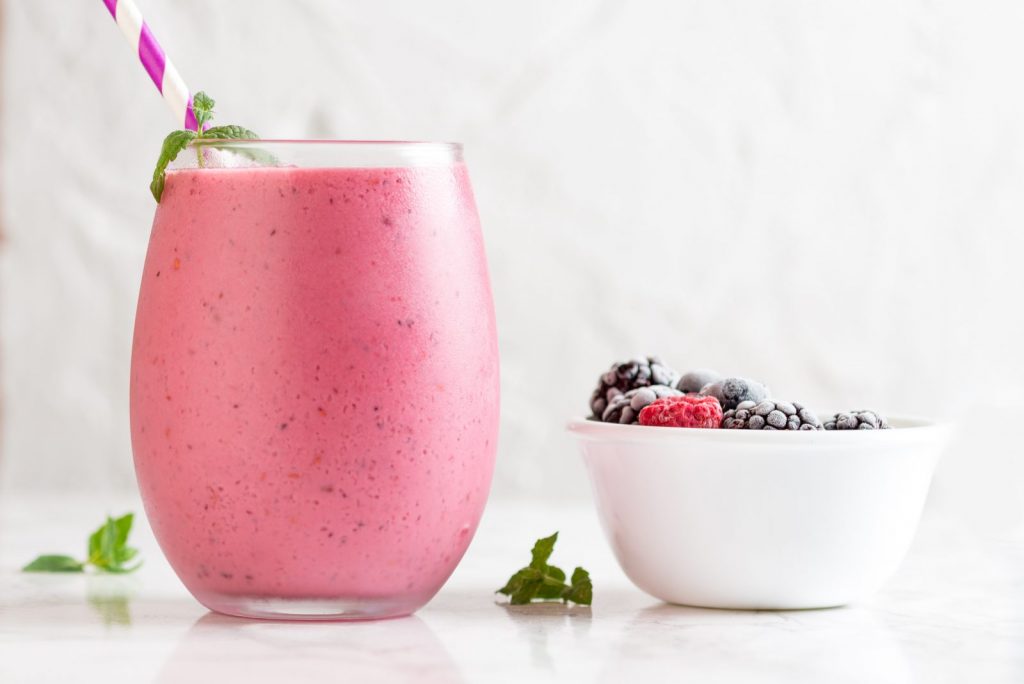
Photo by Shawn Fields on Unsplash
In the middle of a busy day, I often resort to a protein-powder & fruit smoothie for lunch as it’s an easy and super-quick solution when I am tired and short on time. I have to follow a low FODMAP diet and I am also plant based, so which is the best low FODMAP vegan protein powder?
The low FODMAP vegan protein powder I recommend is Sun Warrior Classic Protein Blend. When my tummy is sensitive and I have an IBS or SIBO flare-up, then this is the only blend I can tolerate. This is the only one that uses fermented rice, which means that the starches are partially broken down, so are easier to digest.
Why low-FODMAP?
For many people with IBS or SIBO, our gut microbes are out of balance or growing in the wrong place. So reducing consumption of ‘FODMAPS’ (fermentable oligosaccharides, disaccharides and polyols) which are microbes’ favourite food, can help to control symptoms.
Which protein powder will be right for me?
Everyone has a slightly different set of microbes in their digestive system. Which protein powder you can tolerate will depend on your particular personal complement of microbes and where they are living along your digestive system.
The only way to find out is through trial and error. Generally, try a protein powder when your gut is in a fairly good place and with fruits or veggies that you know you can tolerate well.
Types of protein used in vegan protein powders
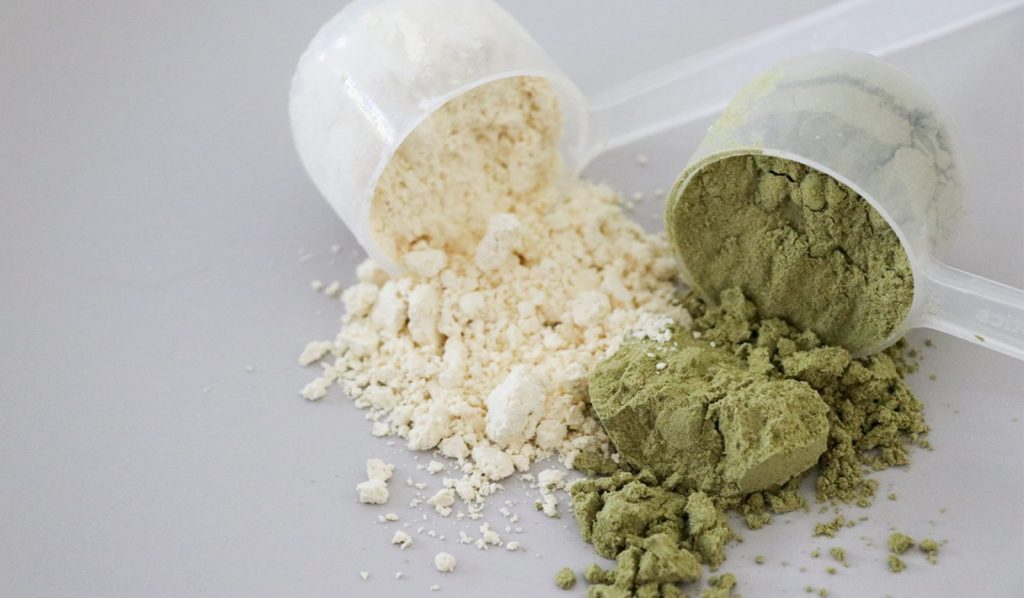
Photo by Gesina Kunkel at HappyVeganFit
There are various protein powders on the market and all tend to use one or a combination of these vegan protein sources:
- Rice protein isolate
- Hemp protein isolate
- Pea protein isolate
- Quinoa flour
- Soya protein isolate
Many of these have recently been tested by Monash University (the researchers who discovered FODMAPs as a risk for IBS).
Pea protein isolate is sourced from yellow peas, which are high FODMAP, but product is an ‘isolate’ and is classed as low FODMAP in a 2018 study. Despite this, my personal experience is that it is not well tolerated (by me, at least).
Hemp protein was also shown to be low FODMAP in the recent Monash study, but personally, I don’t tolerate it well – but you might be different so give it a try!
Quinoa flour is usually included as part of a protein blend rather than sold on its own as a protein supplement. Although quinoa is usually ok in small amounts for many with IBS, I find I do not tolerate quinoa flour-containing protein blends well – perhaps because the flour is raw (and those of us with IBS are usually better with cooked stuff).
Soya protein isolate is great, but if as a vegan you’re getting a lot of of soya through things like tofu and tempeh, then maybe give your body a break and switch it up a bit. Soya is also a common allergen and so I figure, consume in moderation…
In summary: the best protein source for those of us with IBS is likely to be rice protein – but you’ll need to find what works for you!
What does ‘isolate’ mean?
A protein isolate has undergone more processing to ‘isolate’ the protein from other constituents as much as possible. ‘Concentrate’ usually just means that the whole plant extract has been concentrated to remove water and fibre.
Are flavoured vegan protein powders low-FODMAP?
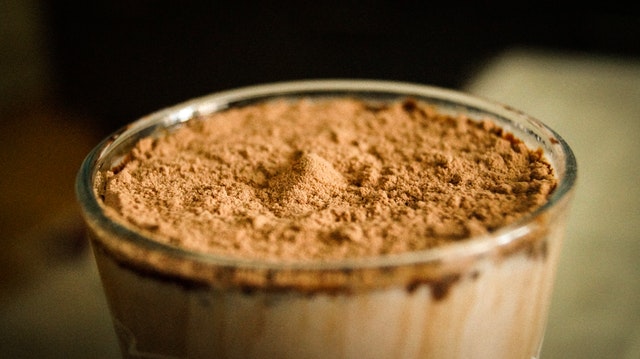
There are many of these on the market (usually vanilla, chocolate or berry flavoured) and some use sugar (a no-no for those of us on a low-FODMAP diet) but most use artificial sweeteners. Not all sweeteners are low-FODMAP – xylitol and other ‘sugar alcohols’ like mannitol and sorbitol can cause digestive issues – which is why, by UK law, products containing these have to state ‘may have laxative effects’. For IBS sufferers, read this as ‘will cause IBS flare up’! So, my view is: avoid…
Erythritol is completely different even though it is a sugar alcohol – and it’s my favourite sweetener! Why?
As it passes through your digestive system, 80% is absorbed into your bloodstream (without affecting blood sugar! Hurray!) and is excreted unchanged by the body. With xylitol, by contrast, all of it stays in the gut, is fermented by gut microbes, hence the diarrhoea and bloating this sweetener causes.
Only 20% of erythritol is left in the gut, and this means very few problems for most people with SIBO or IBS. Find out more here. We use erythritol and stevia in our low-sugar range of LOVENUTTY nut butters, so you can add these to your smoothies without triggering your symptoms.
What about other sweeteners used in low-FODMAP vegan protein powders?
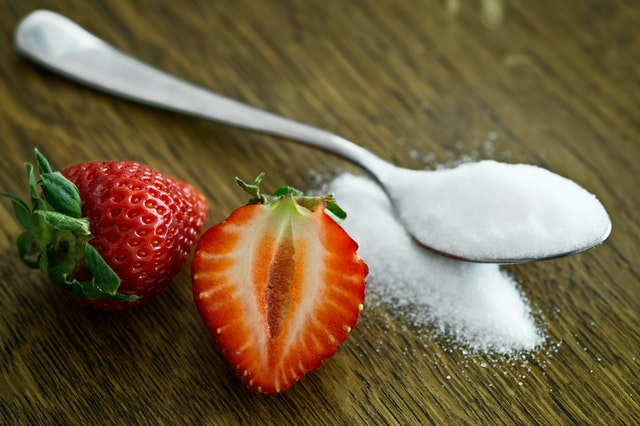
Stevia or more accurately, steviol glycosides, are plant extracts of the Stevia plant that grows in to Paraguay and other tropical areas of the Americas. The extreme sweetness of the leaves has been known locally for centuries but has recently been cultivated and manufactured commercially on a large enough scale to be sold in supermarkets. It has a bit of an aftertaste, which some people seem to taste more strongly than others. In LOVENUTTY nut butters, we only use a very small amount of stevia, so the aftertaste is minimal.
Fortunately, use of ‘bad’ sweeteners like sucralose and aspartame are on the decline. These are OK, FODMAP-wise, but from a health point of view: definitely avoid!
In summary: the absolute best sweeteners for IBS and SIBO are erythritol and stevia.
What additives are typically contained in protein powders that can trigger IBS?
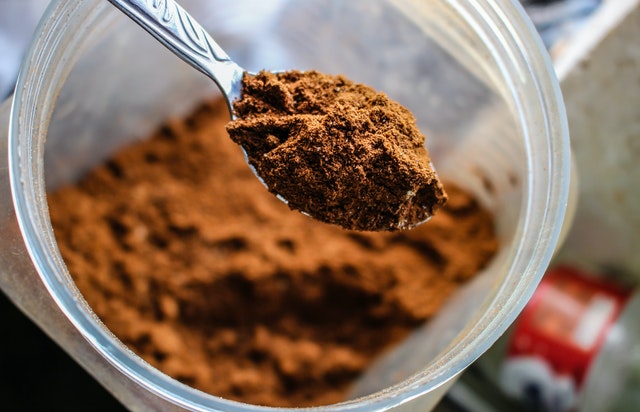
If you have SIBO, in particular, look out for ‘chicory fibre’ or ‘inulin’. Many flavoured vegan protein powders contain these and they are generally viewed as ‘healthful’ because they are prebiotics that encourage the growth of beneficial microbes.
If you have SIBO and have these beneficial microbes growing in the wrong place (i.e. your small intestine), then prebiotics like these can be a disaster and a highly regrettable… Best to avoid.
Also, it’s worth considering carefully which fruit you’re going to add to your smoothie. Some people with IBS tolerate fruit better than others. Low FODMAP fruits include citrus and most berries.
What to look for in a vegan protein powders for IBS and SIBO

The perfect vegan protein powder for IBS or SIBO has low-FODMAP protein as its base and does not contain sugar alcohols (the ‘P’ in FODMAP) unless it’s erythritol. Here are some widely available ones:
Best unflavoured low-FODMAP vegan protein powder
Click the links below to find out the latest price on Amazon.
Sunwarrior Natural, 1 lb 5 oz (Natural, 1 Pack (1 x 500 g)
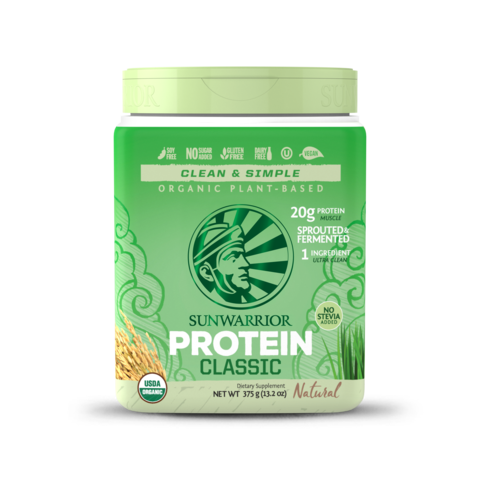
My personal favourite – and the one I find easiset to tolerate. This protein powder is made from rice protein that is sprouted and fermented for the easiest digestion possible. It also has no additives to mess about with my microbes.
INGREDIENTS: Sprouted and fermented raw Whole Grain Brown Rice Protein.
BodyMe Organic Vegan Protein Powder Blend | Naked Natural | 1kg
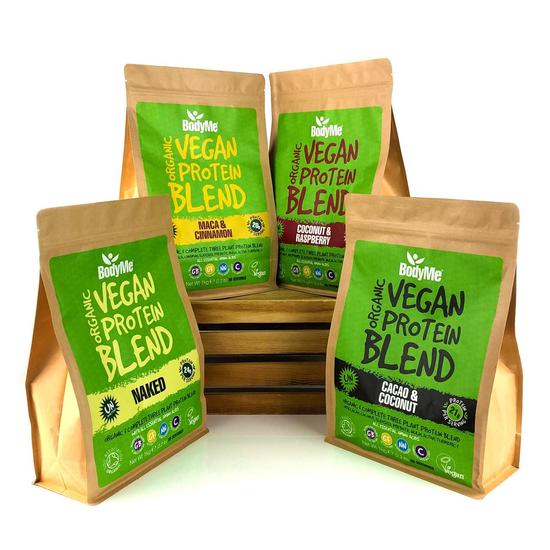
The rice protein part of this blend is made from sprouted rice, meaning that some of the potential FODMAPs have started to be broken down and should be easier to digest.
INGREDIENTS: Organic vegan protein powder blend (organic pea protein, raw organic sprouted brown rice protein, raw organic hemp seed protein).
Naked Vegan Protein Powder Super Blend (1kg) Unsweetened
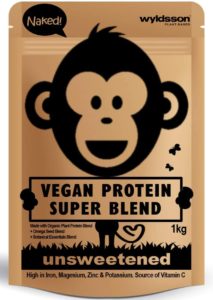
This product has a nice mix of protein sources in the blend, helping dietary diversity!
INGREDIENTS: Organic Plant Protein Blend (Pea Protein, Pumpkin & Sunflower) 84%, Omega Seed Blend (Flax & Chia) 8%, Botanical Essentials Blend (Organic Baobab, Turmeric, Cacao & Cinnamon) 8%.
Best vanilla vegan low-FODMAP protein powders
Sunwarrior Classic Raw Vegan Superfood Protein Powder, Vanilla, 1kg
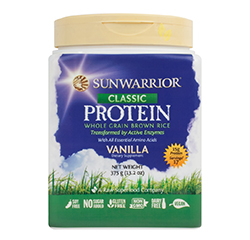
This is my go-to for a treat. It has a complete amino acid profile (meaning that it contains all 9 essential amino acids that can’t be synthesised by the human body and need to be taken in through the diet).
INGREDIENTS: Raw Whole Grain Brown Rice Protein, Rice Oligodextrin, Vanilla Extract, Stevia, Xanthan Gum, Ancient Sea Salt, Pectin
Vega Clean* Protein | Vegan | Gluten Free | Plant Based Protein Powder | Vanilla | 518g

This protein powder has a diverse mix of protein sources, which is great. It does have some xanthan gum, which some might find aggravates their symptoms.
INGREDIENTS: Pea protein, Pea Starch, Hemp protein, Pumpkin protein, Natural vanilla flavouring with other natural flavourings, Alfalfa protein, Sea Salt, Natural Caramel flavouring, Sweetener (Steviol glycosides), Stabilizer (Xantham gum), Pineapple bromelain, Natural flavouring.
Best chocolate vegan low FODMAP protein powders
Sunwarrior Classic Raw Vegan Superfood Protein Powder, Chocolate, 1kg
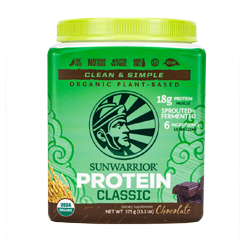
I love the classic blend from Sun Warrior is that the rice protein is sprouted and fermented. Some of the other ingredients in this mix, such as pectin, oligodextrin and xanthan gum could well cause problems if you have IBS or SIBO, but give it a try and see how your body handles it.
INGREDIENTS: Sprouted and fermented raw Whole Grain Brown Rice Protein, Organic Cocoa, Natural Flavor (Vegan), Chocolate Extract, Rice Oligodextrin, Stevia, Xanthan Gum, Ancient Sea Salt, Pectin
MISSFITS – Vegan Protein Powder (Added Nutrients) – Chocolate 500g
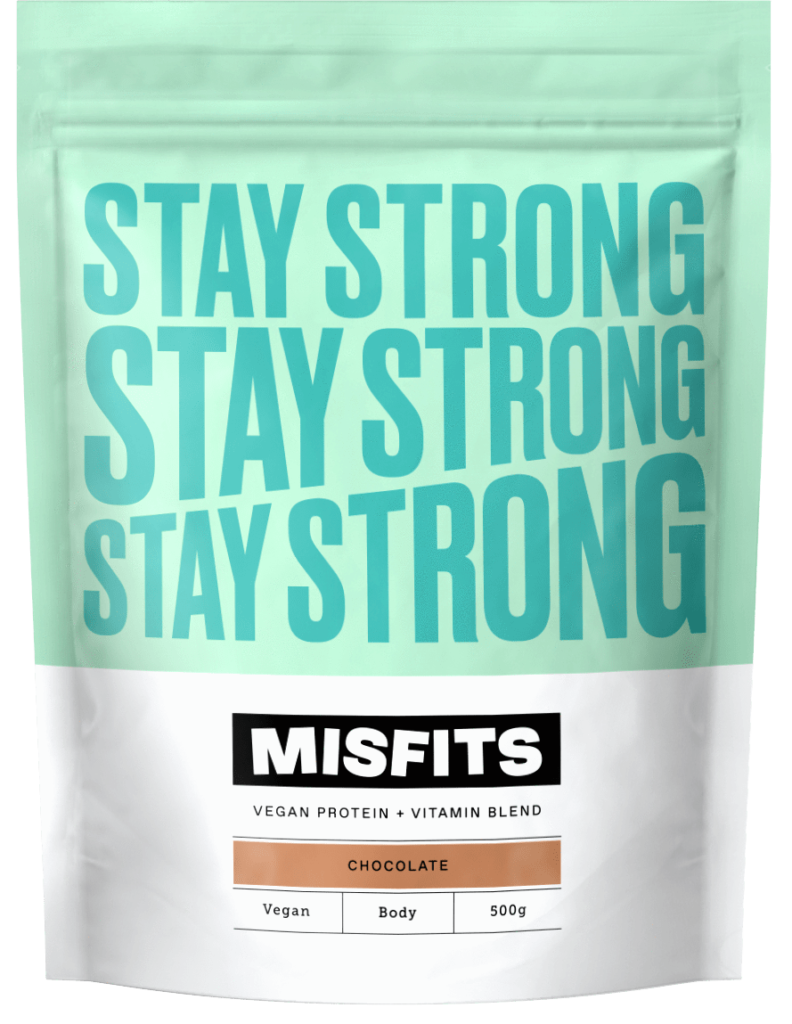
This product has the added advantage of vitamins and digestive enzymes. I liked the flavour but the digestive enzymes didn’t really help me personally – but they might work for you!
INGREDIENTS: Pea Protein Isolate (75%), Natural Flavouring with Stevia, Glutamine, Cacao Powder, Flax Seed Powder, Green Tea Extract, Digestive Enzyme Blend (Carrier: Maltodextrin, Alpha-Amylase, Neutral Protease, Cellulase, Lactase, Lipase), Bamboo Extract, Vitamin B12 (Methylcobalamin), Zinc Citrate Dihydrate

Hi!
I’m Dr Sian and I LOVE experimenting in the kitchen with plants and I am so happy to be able to share my recipes with you here. I live in Wiltshire, UK with my partner and two children.
I post new recipes and articles about heath (particularly gut health) regularly – watch this space! xx

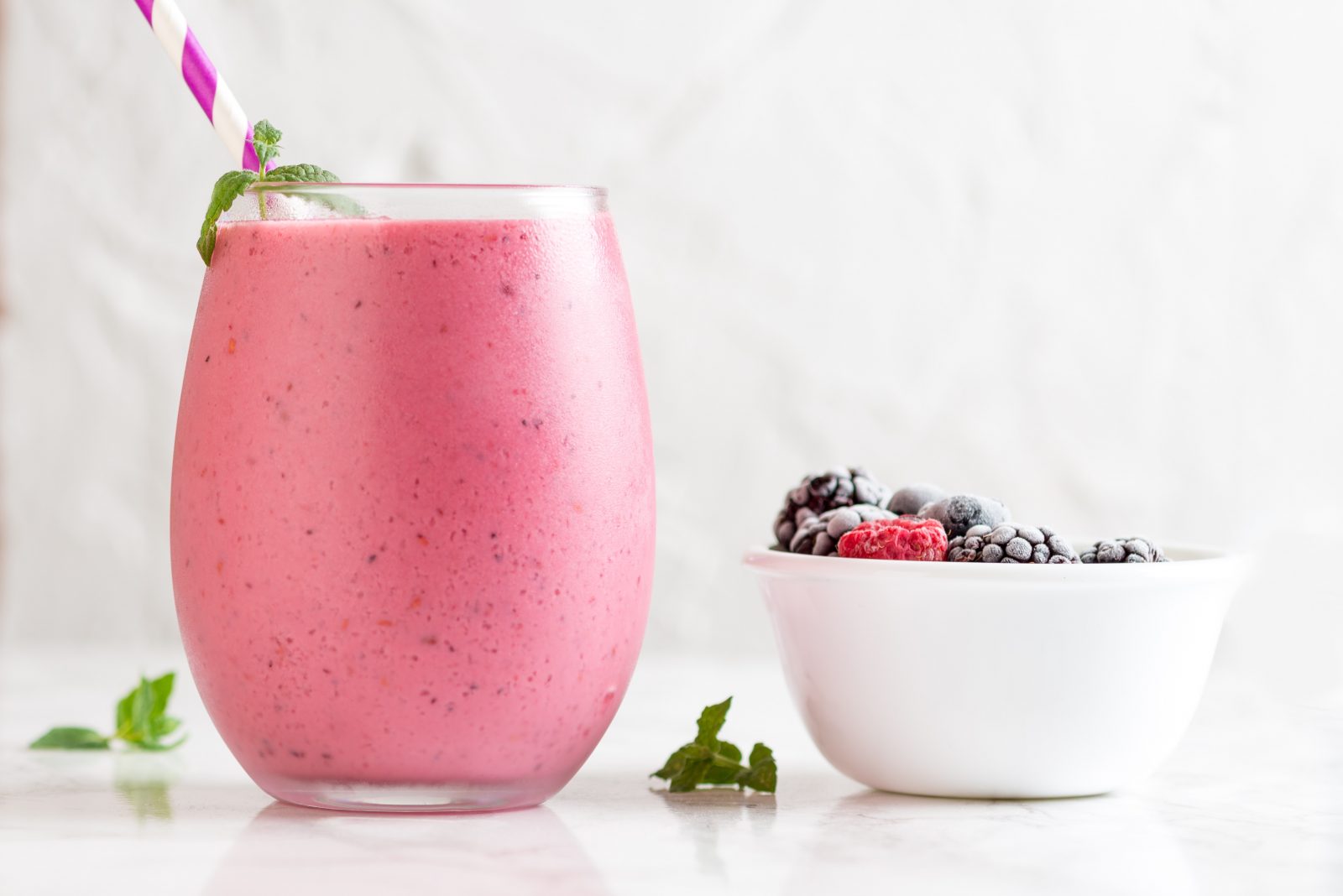
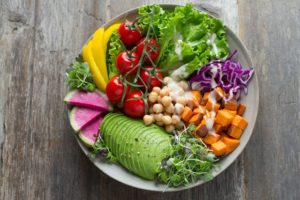
[…] 1 scoop of Chocolate brown rice protein powder by Garden of Life [see why I recommend this for people with IBS here] […]